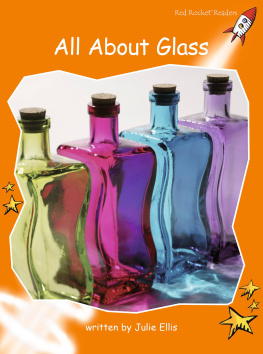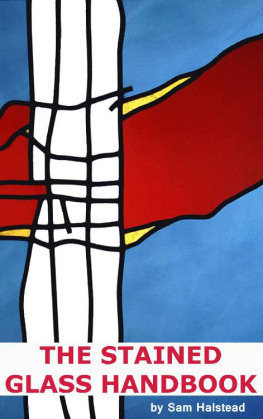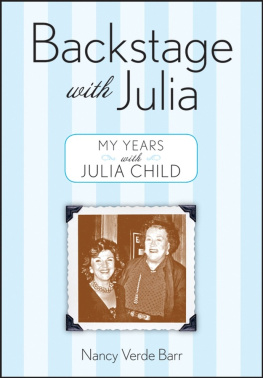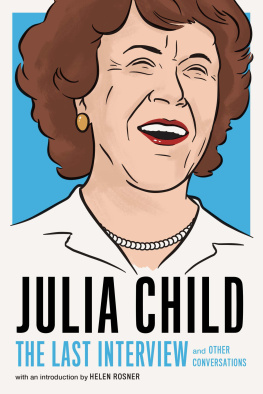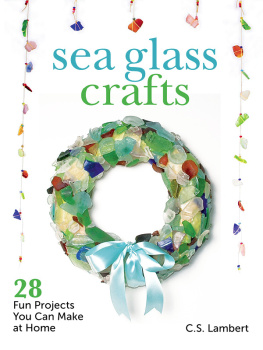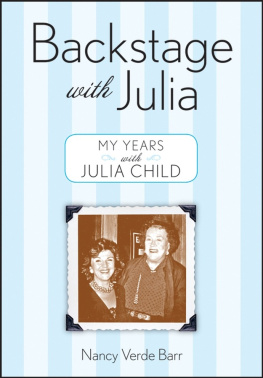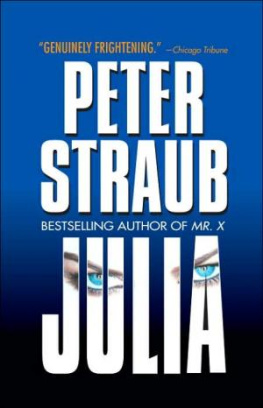Julia Glass - I See You Everywhere
Here you can read online Julia Glass - I See You Everywhere full text of the book (entire story) in english for free. Download pdf and epub, get meaning, cover and reviews about this ebook. year: 2008, publisher: Pantheon Books, genre: Art. Description of the work, (preface) as well as reviews are available. Best literature library LitArk.com created for fans of good reading and offers a wide selection of genres:
Romance novel
Science fiction
Adventure
Detective
Science
History
Home and family
Prose
Art
Politics
Computer
Non-fiction
Religion
Business
Children
Humor
Choose a favorite category and find really read worthwhile books. Enjoy immersion in the world of imagination, feel the emotions of the characters or learn something new for yourself, make an fascinating discovery.

- Book:I See You Everywhere
- Author:
- Publisher:Pantheon Books
- Genre:
- Year:2008
- Rating:4 / 5
- Favourites:Add to favourites
- Your mark:
- 80
- 1
- 2
- 3
- 4
- 5
I See You Everywhere: summary, description and annotation
We offer to read an annotation, description, summary or preface (depends on what the author of the book "I See You Everywhere" wrote himself). If you haven't found the necessary information about the book — write in the comments, we will try to find it.
I See You Everywhere — read online for free the complete book (whole text) full work
Below is the text of the book, divided by pages. System saving the place of the last page read, allows you to conveniently read the book "I See You Everywhere" online for free, without having to search again every time where you left off. Put a bookmark, and you can go to the page where you finished reading at any time.
Font size:
Interval:
Bookmark:
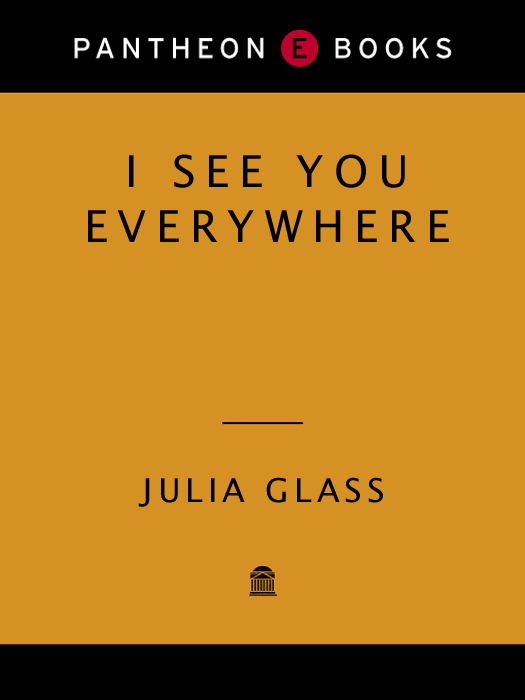
ALSO BY JULIA GLASS
Three Junes
The Whole World Over
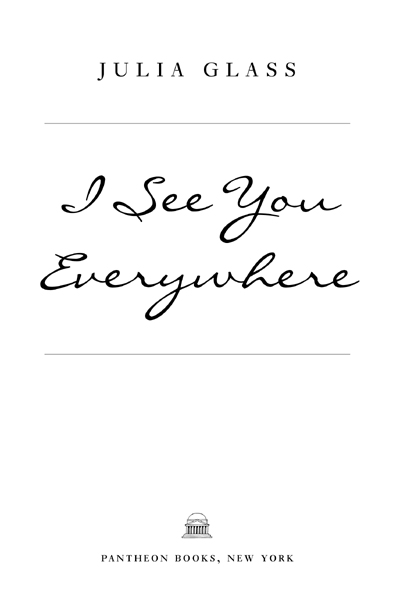
This is a work of fiction. Names, characters, places, and incidents either are the product of the authors imagination or are used fictitiously. Any resemblance to actual persons, living or dead, events, or locales is entirely coincidental.
Copyright 2008 by Julia Glass
All rights reserved. Published in the United States by Pantheon Books, a division of Random House, Inc., New York, and in Canada by Random House of Canada Limited, Toronto.
Pantheon Books and colophon are registered trademarks of Random House, Inc.
Grateful acknowledgment is made to Jalma Music for permission to reprint an excerpt from Green Grass, written by Tom Waits and Kathleen Brennan, copyright 2004 by Jalma Music (ASCAP). Reprinted by permission of Jalma Music.
The following pieces were previously published in slightly different form: Husbandry in American Short Fiction; Coat of Many Colors in Bellingham Review; and Now Is Not the Time as My Sisters Scar and The World We Made as The World Weve Made in the Chicago Tribune; I See You Everywhere on FiveChapters.com; The Price of Silver in Five Points; and A Door to the Sky in The Southampton Review.
Library of Congress Cataloging-in-Publication Data Glass, Julia, [date]
I see you everywhere / Julia Glass.
p. cm.
eISBN: 978-0-307-37777-7
1. SistersFiction. I. Title.
ps3607.L37117 2008 813.6dc22 2008000212
www.pantheonbooks.com
v3.1
For Carolyn
and Robert
Dont say good bye to me
Describe the sky to me
And if the sky falls, mark my words
Well catch mocking birds
From Green Grass,
by Tom Waits and Kathleen Brennan
I avoid reunions. Im not a rebel, a recluse, or a sociopath, and Im too young to qualify as a crank, even if its true that I just spent the evening of my twenty-fifth birthday not carousing with friends or drinking champagne at a candlelit table for two but resolutely alone and working, glazing a large ovoid porcelain bowl while listening to Ella Fitzgerald sing songs by the Gershwin brothers. (A crank could never love Gershwin.) My one real boyfriend in college, just before we broke up, told me Im nostalgic to a fault. He professed contempt for what he called the delusional sound track to our parents deluded lives. He informed me that you cant be nostalgic for things that had their heyday before you were so much as born. Just about any member of my family would have laughed him out the door and down the garden path.
Family reunions are the worstall that competition disguised as fellowshipand theyre also the hardest to avoid. But when my fathers Great-Aunt Lucy died last summer, there was an inheritance at stake, a collection of antique jewelry. Not the glossy priceless stuffno diamonds, tiaras, or niagaras of pearls. Not things youd sell but things so deliciously old-fashioned and stylish that to wear them makes you feel like a character from a Jane Austen novel or a Chekhov play. The one piece I remembered most vividly was a cameo, two inches square, ivory on steel-blue Pacific coral, a womans face inclined toward her hand, in her slender fingers an iris. Aunt Lucy had worn that cameo day and night, winter and summer, on lace and wool. Maybe shed left us a charm bracelet, maybe earrings of garnet or Mexican silver, but mostly I wondered about that cameo. And wanted it. Id wanted it since I was a little girl. One of my earliest memories is of sitting on Lucys lap, squirming to find a comfortable spot on her bony thighs yet happy to feel her kind honeyed voice in my hair as she talked with the other grown-ups gathered on her porch. She did not object to my poking and fingering the cameo, probing its fragile details: the womans eyelids and earlobes, the cuticles of her nails, the harmoniously wandering tendrils of her hair. She let me borrow it once, for a family dinner at a country inn.
Because Lucy never had children, not even a husband, my father long ago became the one who kept an eye on her in the last decades of her very long life. Geographically, he was the closest family member by far; out of a large, tenaciously Confederate clan, they were the only two living anywhere you can count on snow. Once Dad decided to stay north, after earning two degrees at Harvard, the family lumped him together with Lucy: How are the defectas faring up yonda? a cousin might ask Dad at a wedding in Memphis or Charleston. Happily, their proximity blossomed into genuine affection.
So Dad was the executor of Lucys will, which emerged from her bureau drawer along with a letter to my father that shed written a year before she died. It began, To my splendid grandnephew Beauchance: Before I take my irreversible leave (which I suppose I will now have taken, strange to think), I am seizing this lucid moment to write down a few matters pertaining to the house and my ragbag possessions therein. I have little doubt that I shall have left the house in a rather sorry state, for which I apologize. Be charitable, if you can, to any bats or raccoons which may have colonized the attic or basement (though none to my knowledge have done so), and please take Sonnys word on any tasks for which he claims I still owe him payment; our mutual accounting has grown slack if not capricious
Over the phone, Dad read me the letter in its crisp yet meandering entirety, stopping now and then to chuckle. I heard no tears in his voice until the end, where she wrote, Whatever modest adornments pass for jewelry, I leave to your daughters, Louisa and Clement. I did not become as intimately acquainted with them as I would have liked, but I did know the satisfaction, one summer to the next, of seeing how they grew; as I wish I had seen you evolve in your youth. I wish I had known much sooner, Beau, that you would become the facsimile of a perfect son, a gift whose pleasures I wish I had been blessed to know firsthand.
His voice cracked on the word gift, as if he didnt deserve such gratitude, my father who will do just about anything for anyone, driving my mother crazy with all the favors he does for everyone else (including, as she likes to say, any random citizen of Outer Slobovia and its most godforsaken suburbs).
I decided to fly across the entire country because I couldnt bear the thought that if I didnt show up in person, my sister might inherit everythingincluding that cameoby default. On the plane, I tried to decide which of two equally vulgar motives, materialism or spite, had compelled me to buy a ticket I couldnt afford to a place where Id see no one I wanted to see. My life was not, as people like to say, in a good placethough, ironically, the place where I lived at the time happened to be Santa Barbara. So I made excuses and timed my visit to avoid the masses of cousins, aunts, and uncles who would descend on Lucys house to grope the heirlooms by day and drink too much bourbon by night. I may share their Huguenot blood, but not their bad taste in booze and their glutinous drawl. I will never forget how, when our grandmother died two years ago, the family marauded her New Orleans house with no more respect than the Union soldiers who stripped us all bare a century back. Youd think, with all our costly educations, the reconstructed Jardines would avoid civil wars. Well, ha. There was an ugly brawl, which featured weeping and a smashed lamp, over the Steinway grand. Someone with Solomonic intentions actually went so far as to crank up a chain saw. I could not deal with that type of gathering all over again. Whether I could deal with Clem remained to be seen.
Font size:
Interval:
Bookmark:
Similar books «I See You Everywhere»
Look at similar books to I See You Everywhere. We have selected literature similar in name and meaning in the hope of providing readers with more options to find new, interesting, not yet read works.
Discussion, reviews of the book I See You Everywhere and just readers' own opinions. Leave your comments, write what you think about the work, its meaning or the main characters. Specify what exactly you liked and what you didn't like, and why you think so.

